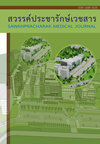ผลลัพธ์ของการฟื้นฟูสมรรถภาพหัวใจผู้ป่วยหลังการสวนหลอดเลือดหัวใจในระยะที่ 2 ในโรงพยาบาลสวรรค์ประชารักษ์ จังหวัดนครสวรรค์
Outcome of Phase II Post-Percutaneous Intervention Cardiac Rehabilitation Program at Sawanpracharak Hospital, Nakhon Sawan Province
Abstract
วัตถุประสงค์ : เพื่อศึกษาผลลัพธ์ทางคลินิกของผู้ป่วยที่มารับการตรวจติดตามฟื้นฟูสมรรถภาพหัวใจแบบผู้ป่วยนอกในระยะที่ 2 หลังได้รับการทำหัตถการสวนหลอดเลือดหัวใจ
สถานที่ศึกษา : ศูนย์เวชศาสตร์ฟื้นฟูหัวใจ โรงพยาบาลสวรรค์ประชารักษ์
รูปแบบการวิจัย : การศึกษาไปข้างหน้าเชิงวิเคราะห์
กลุ่มตัวอย่าง : ผู้ป่วยที่ได้รับการวินิจฉัยโรคหลอดเลือดหัวใจและได้รับการรักษาด้วยการทำหัตถการสวนหลอดเลือดหัวใจภายใน 6 เดือน และมารับการตรวจติดตามฟื้นฟูสมรรถภาพหัวใจแบบผู้ป่วยนอกในระยะที่ 2 ในช่วงกันยายน 2560 ถึงตุลาคม 2563 จำนวน 237 คน
วิธีการศึกษา : เก็บข้อมูลจากเวชระเบียนผู้ป่วยนอกและแบบบันทึกข้อมูลเวชศาสตร์ฟื้นฟูหัวใจระยะที่ 2 นำมาวิเคราะห์ข้อมูลเชิงประชากรและข้อมูลทางคลินิกต่างๆ และวิเคราะห์เปรียบเทียบอัตราการเต้นของหัวใจ ค่าการรับรู้ความเหนื่อย (rating of perceived exertion) และผลการประเมิน 6-minute walk test ระหว่างการมารับการตรวจติดตามครั้งที่ 1 และครั้งที่ 2
ผลการศึกษา : ผู้ป่วยที่เข้าเกณฑ์การศึกษา อายุเฉลี่ย 60.4 ± 11.0 ปี สัดส่วนเพศหญิงต่อเพศชาย 1 : 1.7 มารับการตรวจติดตามครั้งแรก 21.9 ± 19.5 วัน หลังจากได้รับการสวนหัวใจ ผู้ป่วยส่วนใหญ่มีความเสี่ยงในการฟื้นฟูสมรรถภาพหัวใจในระดับต่ำ และมี functional class ขณะมารับการตรวจครั้งแรกที่ระดับ 1-2 ผู้เข้าร่วมการศึกษาที่มารับการตรวจติดตามตั้งแต่ 2 ครั้งขึ้นไปมีจำนวน 92 คน ผลการเปรียบเทียบทั้ง 2 ครั้งพบว่าอัตราการเต้นของหัวใจในขณะพัก มีค่าลดลง (76.3 ± 13.4 ครั้งต่อนาที และ 70.1 ± 10.9 ครั้งต่อนาที p < 0.001) ส่วนร้อยละของอัตราการเต้นของหัวใจขณะออกกำลังกาย (ร้อยละ 18.8 ± 14.2 และ ร้อยละ 23.0 ± 14.4, p = 0.016) และระยะทางจากการประเมิน 6-minute walk test มีค่าเพิ่มขึ้นอย่างมีนัยสำคัญทางสถิติ (349.4 ± 108.1 เมตร และ 410.1 ± 94.4 เมตร p < 0.001)
วิจารณ์และสรุป : ผู้ป่วยที่มารับการตรวจติดตามมีผลลัพธ์ทางคลินิกในทางที่ดีขึ้น ซึ่งเป็นผลลัพธ์โดยรวมจากการรักษาโดยทีมสหสาขาวิชาชีพ การฟื้นฟูสมรรถภาพหัวใจระยะที่ 2 ยังมีปัญหาเรื่องการเข้าถึงการรับบริการและกลับมารับการตรวจติดตามซ้ำ
คำสำคัญ : การฟื้นฟูสมรรถภาพหัวใจ, ภายหลังการทำหัตถการสวนหลอดเลือดหัวใจ, การประเมิน 6-minute walk test
Abstract
Objective : To study the clinical outcomes of the patients receiving outpatient phase II post-percutaneous intervention cardiac rehabilitation program
Setting : Cardiac Rehabilitation Center, Sawanpracharak Hospital, Nakhon Sawan Province
Design : Prospective observational cohort study
Subjects : 273 patients with coronary artery disease who were treated with percutaneous coronary intervention within 6 months and receiving outpatient phase II cardiac rehabilitation program since September 2017 to October 2020
Method : Data were collected from outpatient medical records and phase II cardiac rehabilitation records. Demographic and clinical baseline data were analyzed and follow-up heart rate, rating of perceived exertion, and 6-minute walk test results were compared.
Results : The eligible patients, mean age 60.4 ± 11.0 years, female to male ratio 1: 1.66, were recruited. The period between the intervention and the first visit were 21.9 ± 19.5 days. Patients were mainly stratified as low risk and almost all had functional class 1 or 2 at first visit. Totally, there were 92 participants with 2 or more follow-up visits. Following the second visit, the resting heart rate (76.3 ± 13.4 bpm vs. 70.1 ± 10.9 bpm, p < 0.001) was significantly decreased, whereas the percentage of heart rate reserve (18.8 ± 14.2 % vs. 23.0 ± 14.4 %, p = 0.016) and the 6-minute walk test distance (349.4 ± 108.1 meters vs. 410.1 ± 94.4 meters, p < 0.001) were significantly increased.
Conclusion : Clinical outcomes of the patients were improved, reflecting the results of treatment from the multidisciplinary team. Service accessing and follow-up care were still problematic and needed solving.
Keywords : cardiac rehabilitation, post-percutaneous intervention, 6-minute walk test



